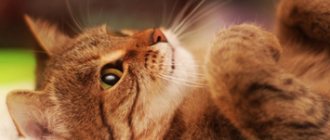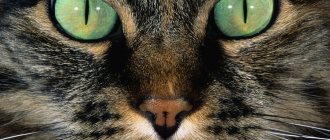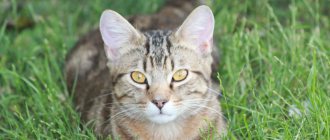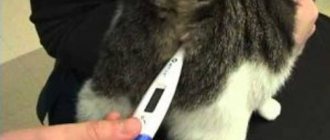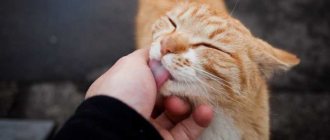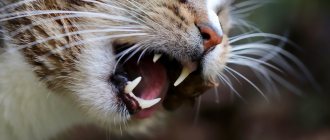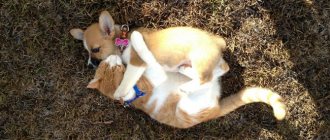Substances such as alcohol are deadly to cats. Once in the animal’s body, an alcoholic drink has an extremely negative effect on all organs and systems. Intoxication develops, which manifests itself in heart rhythm disturbances, drowsiness, and loss of coordination of movements. The condition is dangerously fatal, so the owner should know how to properly help the pet.
According to veterinarians, some cats love low-alcohol drinks, but quickly get used to alcohol and develop alcoholism, which is incurable in animals.
Is alcohol harmful to cats and dogs?
Alcohol poisoning in pets is very rare because most pets find the taste unpleasant.
But during a party or party, sometimes things get out of your (or your pet's) control.
If your pet laps up alcohol, it can affect him the same way it affects people - either he will sleep, or, in the most extreme cases, he will end up in the veterinary hospital.
...and involuntarily
Cases range from comical to downright cruel. For example, on the set of the 1934 film “Jolly Fellows,” some off-screen scenes with the supporting “animal cast” caused a lot of trouble for the group. According to legend, the pig got drunk on the first take, emptied the plate of cognac, and, squealing and squealing, began making its solemn “walk” right across the table, smashing the dishes. According to eyewitnesses, having had his fill of fun, the poor guy flopped unconscious onto a plate and fell asleep. The “actor” came to his senses only when one of the filmmakers tried to bite him. The bull, having drunk ten liters of vodka, staged a bacchanalia, went on a rampage and began chasing the filmmakers around the entire set. Neither the hypnotist nor the famous trainer Durov could calm the drunken animal. The veterinarian solved the problem “wedge by wedge”: he treated the bull to vodka with bromine. So, in their desire to somewhat “calm down” the animal crowd, the team crossed the line of reason and almost suffered from the actions of the animals.
Do you remember the famous poem by Sergei Yesenin “Give me a paw, Jim, for luck...”? It was dedicated to the Doberman of the famous actor Vasily Kachalov. Like his master, Jim adored funny “cabbages,” and the entire creative intelligentsia adored Jim. Yesenin, who had especially tender feelings for the dog, usually asked through his friends to “bow to Kachalov. And definitely for Jim.” But bohemia not only “bowed” to the dog: knowing that the great actor’s favorite was especially sensitive to wine, the guests made sure to pour a bowl for the dog as well. After the contents were drunk, Jim staggered, lay down on the floor and fell asleep in a drunken stupor. So the dog immortalized in poetry became an alcoholic.
But the matter is not limited to historical anecdotes. Animals inevitably become alcoholics in our age. In 2015, a case in Sochi caused a public outcry. In a small zoo at the restaurant they kept two blind bears. Visitors to the entertainment establishment regularly served them beer and other alcohol-containing drinks. The owner knew about the addiction of his pets, but did not in any way prevent the restaurant guests from getting them drunk. Local activists and the prosecutor's office came to the defense of alcoholic animals. The bears were sent for rehabilitation to Romania.
Alcohol content for pets
You shouldn't worry about what kind of alcohol your pet drinks, but rather how much he drinks.
"We have this myth about people like, 'I can't drink tequila,' or 'Rum is really bad for me,'" says Dr. Christine Rutter, assistant professor of small animal clinical sciences. Texas A&M University College of Veterinary Medicine and Biomedical Sciences. "You may have a reaction to something specific in this product, but drink after drink, it's the ethanol that will knock you out."
The same can be said about pets. But since most pets are much smaller than people, a smaller dose of alcohol may be more dangerous for them than for us.
“The dog weighs significantly less and does not drink alcohol,” says Dr. Rutter. "So a dog's alcohol breakdown is not regulated in the same way as a human who drinks alcohol occasionally."
Harm of alcohol to a cat's body
Any alcoholic drink contains ethyl alcohol or ethanol, which is very poisonous to animals. Even low-alcohol drinks such as beer or wine cause damage. In cats, the stomach is constantly active, so digestive processes occur almost continuously. Therefore, alcohol is quickly absorbed and enters the bloodstream, reaching the brain. The consumption of alcoholic beverages by cats, even in minimal quantities, depresses the activity of the central nervous system, affecting all centers - visual, respiratory, motor. As alcohol spreads throughout the body, it has the following negative effects:
For small mustaches, such drinks are deadly.
- Acts on the liver and kidneys. Organ dysfunction can last a lifetime.
- Acidosis. An alcoholic drink changes the composition of the blood, which causes a condition to develop in which the acid-base balance shifts with a decrease in pH levels.
- Gastritis. Alcohol irritates and burns the gastric mucosa, which leads to inflammation and ulcer formation.
- Addiction. 2-3 small doses of alcohol are enough to turn your pet into an alcoholic who feels a hangover and requires alcohol.
- Reduced life expectancy. Cats that drink regularly live 2-3 times less than those who don’t drink.
- Degradation. If a cat loves alcohol, it quickly develops brain degradation with all the negative consequences.
- Heart dysfunction. Alcohol stimulates the release of adrenaline into the blood, which causes it to contract faster. Because of this, cardiac arrest occurs.
- Coma. A few milliliters of alcohol is enough to cause severe intoxication with no reactions. It is especially dangerous if a kitten drinks alcohol, as it can be fatal.
Beware of mixed drinks or alcoholic foods
Although an animal is unlikely to take more than one sip from a glass of wine or scotch with ice, some alcohol-based mixed drinks or cakes may be quite sweet or contain ingredients that animals enjoy.
And sometimes those other ingredients (like chocolate, grapes, raisins, or macadamia nuts) are dangerous on their own.
You should also be on the lookout for hidden sources of alcohol, such as some flavorings, including vanilla and almond, and spices, which may contain essential oils such as cinnamon. “This can cause gastrointestinal irritation,” says Dr. Rutter.
And since ethanol is truly dangerous to pets, also be careful not to let pets get into any cleaning products, mouthwash or hand sanitizer, some of which contain ethanol.
How to recognize alcohol poisoning?
If after drinking the drink your pet becomes excessively affectionate, then she probably suffered from mild alcohol poisoning.
Alcohol enters the body if the owners give cats an alcoholic drink to expel worms, not realizing that this will not get rid of parasites, and the harm of alcohol will aggravate the damage to organs caused by helminths. Some furries like beer because it contains yeast and a minimal amount of alcohol, which does not burn the mucous membranes of the mouth like stronger drinks. Therefore, owners allow their pets to consume it, which is why alcoholic cats appear. Due to the stupidity of the owner, the cat drinks an alcoholic tincture of valerian, eats meat soaked in wine or cooked with wine sauce, and becomes drunk. You can understand that an animal has been poisoned by alcohol by the signs shown in the table:
| Degree of intoxication | Symptoms |
| Lightweight | Slightly unsteady gait |
| Change in behavior - the cat is very affectionate or excited | |
| Abdominal pain | |
| Average | Slow reactions, unnatural drowsiness |
| Impaired coordination of movements | |
| Increased heart rate and breathing | |
| Nausea or vomiting | |
| Frequent urination, sometimes spontaneously | |
| Cloudy look | |
| Dehydration | |
| Convulsive syndrome | |
| Heavy | Complete lack of reactions, deep degree of inhibition |
| Fainting | |
| Temperature reduction | |
| Foamy discharge from the mouth | |
| Difficulty breathing, weak pulse | |
| Comatosis or death |
Signs of alcohol poisoning in dogs and cats
Signs of alcohol poisoning in dogs and cats are usually the same as in humans.
“Alcohol poisoning manifests itself in the same way as in humans,” says Dr. Frydenberg. “So there could be a gastrointestinal disorder. They may vomit or feel sick and may become unsteady.”
Dr. Jennifer Coates, DVM, says other symptoms may include:
- Increased thirst
- Frequent urination
- Lethargy
- Disorientation
In severe cases you may see:
- Muscle tremors
- Paralysis
- Extremely slow and shallow breathing
- Convulsions
- Loss of consciousness
what happens if you give a cat vodka?
Of course, everyone remembers The Master and Margarita. How the fat black cat drank vodka and ate mushrooms. Apparently, Maestro Bulgakov was well versed in this issue. So I'm not the first to see this with my own eyes...
So. We had a hefty black cat, with a more than docile temperament towards his owners (everyday lulls took its toll) and a boorish disposition towards strangers (there was a clear shortage of lulls there). It got to the point that, while walking on the street, I could most brazenly... hmm... mark the legs of a passerby who had the temerity to let this bastard get too close. So the screams from the street: “Kisa... kitty... oh, how good, beautiful, whose are you?.. OH YOU... (further the repertoire changed depending on the vocabulary of the victim). I’LL FUCK YOU!!!” — were a familiar background accompaniment. The cat knew that it wouldn’t get to “sha” no matter what. Not only did he run fast, but he could also scream, in extreme cases. Then a savior appeared, in the form of a small dog and... In general, at the sight of such a strange tandem, tightly and harmoniously holding the defense of the bell on their own gate, everyone without exception was lost.
One evening my hubby showed up after work with two friends and a bottle of vodka. We wanted to celebrate some kind of labor achievement.
This didn’t make me happy at all, but the men approached the matter competently: they handed me a huge package of tomato juice and an equally huge package of ice cream (so that I had something to occupy my mouth without swearing) and asked me to keep me company. Just sit with them.
Okay, let's sit. They drink, have a snack, I serve ice cream. Animals are hovering nearby. Especially the cat.
And then Lyokha, one of her husband’s friends, gets the idea to dream up:
- What happens if you give a cat vodka?
The men look at each other... They think with the rest of their brains and look at me questioningly, they say, who is our main zoologist?
Hm. I know very well what will happen to the cat after valerian, but vodka... And really - what will happen?
I put down the spoon:
- What's the problem? Here's the cat, here's the vodka.
- And... uh... won't it hurt him?
“You can’t kill him with a shovel.”
- How much? So that it definitely doesn't hurt.
- Well... in this pile - enough for your finger. Not for your sausage, but for mine.
In general, the cat was invited to the table. They poured about 15 grams. They opened the havalnik for him and poured vodka into it. The cat, however, didn’t mind. Everyone (even the dog) stared tensely at the “experimental” animal, waiting for a reaction.
We had to wait no more than a minute.
To begin with, everyone vividly remembered the cartoons about Tom and Jerry. Where the cat’s eyes, after another perturbation, begin to broadcast images of circles, spirals and other geometry. This is exactly what happened with our cat. Live.
Then he hiccupped and brought his eyes into focus. As luck would have it, a bowl (about the size of a small bowl) of pickled butter came into focus.
With a cat-banzai noise, he twisted out of the arms holding him and dove headfirst into the bowl. Whole head. With eyes and ears. Up to your neck. A powerful suction was heard, and the contents of the bowl began to rapidly decrease.
The men, who had sobered up instantly, realized that they would now be left without the most delicious snack, and began to drag him away. The cat growled and purred straight from the marinade, clawed at the edges of the “basin,” but with the effort of three men pulling him and a woman who was holding the bowl with both hands, he was still torn off. The dog also took part, sticking his muzzle into the thick of things and trying in his cat-dog language to persuade the cat to let go of the bowl in an amicable way. Just like a seasoned negotiator.
The cat was placed on the floor. His face was wet and foul. Sticking out of the mouth, just like a baby's nipple, was the largest oil can, which was not completely absorbed. The cat looked at us with dull eyes, and in a complex zigzag, purring some kind of cat chanson through the mushroom, went to sleep.
After several minutes of silence, which only happens to completely freaked out people, someone said:
- No, guys. We won’t go for the second one...
What happens if your pet drinks beer or alcohol?
According to Dr. Coates, in mild cases of alcohol exposure, pets usually recover with time and without any other treatment. "Just let them 'sleep it off' in a safe environment."
However, she says that "if you think your pet may have ingested a large amount of alcohol or is exhibiting alarming clinical signs, seek veterinary attention immediately."
If necessary, your veterinarian can hospitalize your pet, giving him intravenous fluids and any other treatment that may be needed, although a pet becoming alcohol intoxicated to the point of requiring hospitalization is extremely rare.
But holiday stress may cause your pets to behave differently than usual, such as surfing the table or digging through the trash for leftovers.
So avoid any dangerous encounters with your pet, keep dangerous food or drinks out of reach, and educate your guests about the dangers that alcohol, beer, wine and many foods pose to pets.
"Drinkers" by nature...
It’s not just people who don’t mind missing out on “a little bit” of something fun. For example, some insects will not refuse fermented plant juice and wine. English naturalist Joy Adamson described the excited behavior of night moths swarming around the edges of a glass of wine. Sometimes bees, which collect already fermented nectar, are guilty of drinking alcohol. Needless to say about flies and other insects that lose their heads from slightly sour jam...
Snails are one of the most ardent fans of beer (this passion destroys them: gardeners use beer traps to eliminate snails and slugs), and birds get drunk after tasting berries that have fermented after frost. In Canada, animal rights activists collect such “drunks” and place them in “sobering stations” - special cages with drinking bowls, where the birds can rest before continuing on their way.
Elephants, who periodically stock up on fermented fruits, and giraffes, who rarely but consistently consume leaves containing alkaloids, or monkeys, who are big fans of eating rotten fruits, are also famous for their addiction to alcohol.
But this is nature. And according to her plan, there should still be no alcoholics among animals. They are usually soldered, in the classical sense of the word, by none other than the one who tamed them.
